by Carol A Westbrook
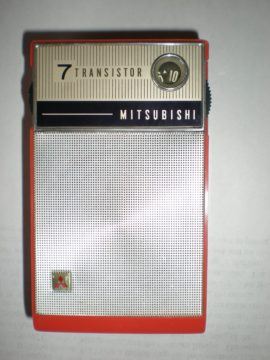
In the summer of 1961, my dad gave me a little transistor radio. My older sister, Lynn, showed me how to tune it to WLS and WCFL, the stations that played music that all the teens listened to. They had the best Chicago DJ’s: Dick Biondi and Larry Lujack, who wise-cracked and took calls. And she showed me how to listen to it under the pillow at night. (Click on the song names to listen to the music.)
One night I heard a song, “The Mountains High” that stuck with me all my life. As a top 40s hit, it was played a lot, until its ratings fell and it disappeared from the air. It’s about a couple who are separated by an impassible mountain. “Don’t you give up, don’t you cry, don’t you give up ‘till you reach the other side…” they sang. This song captured all the angst of a preteen, longing for travel, adventure, and especially love. And love was so unattainable to a 7th grade girl, for the simple reason that the 7th grade boys didn’t care much about girls–yet.
That was the summer of 1961. I was about to enter 7th grade, and I was growing up fast. I was no longer “just a kid down the block.” I was a young woman. My brother threw me off his sandlot baseball team because they had a “no dames” policy, and they finally noticed I was a girl. But I didn’t mind; I had other things to do. I hung with my girlfriends. We talked about boys. We read teen magazines to see the latest styles. We tried on makeup and new hairstyles. We had pajama parties, where we stayed up all night, listening to the top 40 hits on late-night radio. We watched American Bandstand, where a few lucky teenagers got to be on television, dancing to the latest songs played by Dick Clark, the DJ. There was always a popular band playing their top hit, too. How we envied those kids! We paid careful attention to their clothes, hair and their dancing, trying to emulate it.
But best of all, we went to the beach, the wonderful sandy beaches of Chicago. I’d bring nothing with me but my radio, and a tote bag holding, a towel, a quarter for bus fare home, a paperback novel, and lunch–a ham sandwich and a peach. (Ripe peaches were so delicious back then!) I’d lie on the beach, slathered with sun-tan lotion, radio on, hoping a boy would notice me, like they did in the beach movies and TV. It never happened—the boys wanted older, prettier girls. Still, I could dream.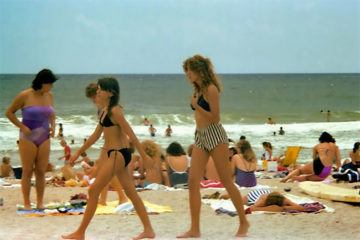
The following year was1962; I would enter 8th grade in the fall. My girlfriends and I tried so-o-o hard to be cool. We wore big bouffant hairdos, tight skirts and jeans, and lots of makeup and hairspray. We would get together and gossip about school, about other girls, but mostly about boys, those marvelous, unattainable creatures.
And we danced! We did “The Mashed Potato,” “The Locomotion” and of course “The Twist.” The Twist was by far the best; in fact, nine of the top 100 records of 1962 were a variant of this fun dance. I listened to my little transistor at night, under the pillow, and at the beach. Getting a tan, listening to just the right radio station, and wearing the latest style in bathing suits–these were of paramount importance. Still no boyfriends, no one to say he loved me, no love songs to sing.
In the summer of 1963 I was thirteen. Life was changing. Our music changed, too, as did our fashions. The surfer scene was upon us! We listened to the Beach Boys singing “Surfin’ USA.” while Jan and Dean sang “Surf City.”
Our fashion changed to match what the surfer girls wore. Gone were the high bouffant, teased hairstyles. We let our hair grow out straight and long, and wore bright and colorful clothing We didn’t have waves suitable for surfing on Lake Michigan, but we had a beach, and we spent as much time there as we could. No longer did I ride a bike. That was too uncool. I had no boyfriend with a car, so I’d take the bus with my best friend, Diane.
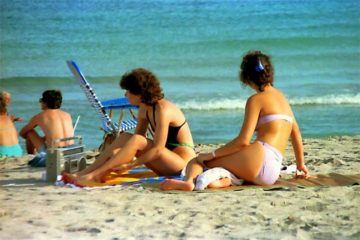 Sometimes we’d take a longer bus ride, bypassing our usual stop, continuing north to Foster Beach. Foster Beach was the coolest place to be! It was the scene for the Broadway hit “Grease,” which was written and first performed in Chicago, although the movie version locates the beach in California. Did you know that the song “Summer Nights” from the film, was originally titled, “Foster Beach?” The play, set in 1950, depicted life on the beach as it actually was for the playwright in the 60’s. It’s just how I remember it, too.
Sometimes we’d take a longer bus ride, bypassing our usual stop, continuing north to Foster Beach. Foster Beach was the coolest place to be! It was the scene for the Broadway hit “Grease,” which was written and first performed in Chicago, although the movie version locates the beach in California. Did you know that the song “Summer Nights” from the film, was originally titled, “Foster Beach?” The play, set in 1950, depicted life on the beach as it actually was for the playwright in the 60’s. It’s just how I remember it, too.
Foster Beach in 1963 was a big sandy beach, filled with teenagers. There was music in the air, as everyone’s radio was tuned to the same station. Foster Beach was where the cool kids hung out. The girls were all beautiful, with long blond hair and colorful, skimpy bikinis. The boys were all handsome, tossing a Frisbee around and flirting with the girls. Romances flourished and floundered—for everyone except young eight-grade girls like myself. Still, we could dream as we listened to love songs on the radio. And summer passed with The Beach Boys playing in the background.
The summer of ‘64 was magnificent! Grade school was over, and high school would start in the fall. Life was about to change again, and something magical was happening with music. Although the surfer sound was still going strong, songs from a couple of British groups began to appear: The Beatles and the Rolling Stones. And they were anything but surfers! They were the advance soldiers in what came to be known as the British Invasion. We still wore our hair long, but we wore bell-bottom pants instead of surfer shorts, and sandals instead of topsiders.
The summer of 1965—my freshman year was over, and I felt like a sophisticated high school student. Madonna High School was an all-girls Catholic school, one of many in Chicago. But I took several summer classes in the public school: Driver’s Education, and touch typing. Both were skills that I would use for the rest of my life.
I had a new best friend, Teresa, who also went to Madonna. We hung out together that summer, biking to Fullerton Ave Beach, or taking the bus to Foster beach. She and I went everywhere, exploring much of the north side of the city. It was the beginning of my life-long wanderlust.
We biked to the Six Corners neighborhood and found a small bookshop, where the hippie-owner gave us an old paperback of Jack Kerouac’s On The Road. He charged nothing for this except a promise to read it, then pass it along to someone else. I was intrigued by my first hippie road trip book! I went back two years later and the bookshop was gone, as if it never existed.
The summer of 1966 marks the end of my sophomore year in high school. We still went to the beach and listened to our transistors. The British invasion was going strong on the airwaves. We listened to the Byrds and the Beatles and the Rolling Stones, and to American groups that played in the British style, like The Monkees and The Turtles. I especially liked “Bus Stop” by the Hollies. Another one of my favorites was “Ferry Cross the Mersey,” sung by Gerry and the Pacemakers. I dreamed of finding a London boyfriend (I eventually had a London boyfriend when I was a single parent adult.)
Teresa and I traveled around the city, with the transistor going along. We wore our bell bottoms and rode our bikes to Old Town, Chicago’s hippie neighborhood. We picked roadside flowers, put some in our hair, and gave out the rest to the hippie denizens we met. The place was amazing!! We saw many storefronts with interesting and questionable wares for sale—and who-knows-what under the counter. There were free stores, head shops, counter-culture bookstores, strange clothing stores, and many, many candle shops. Somehow, we knew instinctively that you had to wear flowers in your hair, and this was fully a year before the hit song, “San Francisco (Wear Flowers in Your Hair)” was released. Within a few years the Old Town hippie scene would disappear when it became a tourist destination, and the true hippies moved to San Francisco. Many of the old buildings would be demolished and replaced with modern high-rises and condos in the name of gentrification.
By the end of this summer of 1966 I had a boyfriend, of sorts. I met him at the Illinois Student Science Fair where we fell madly in love. He lived in Lockport, an exurb of Joliet, 45 miles away, completely out of reach for me. Our romance consisted mostly of letters and phone calls. He listened to Mahler and read Nietzsche (or so he said) and discussed his philosophy of life. I thought he was so intellectual; he thought I was a sophisticated city girl. This was the first of many long-distance relationships of my life. I only saw him in person three times, and the last time, at his prom, we had a falling out about my not wanting to “go all the way.” I never heard from him after that, but I didn’t mind because the summer of 1967 was about to start.
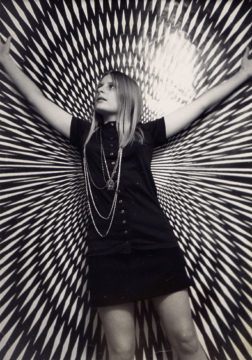 And what a summer it was! In 1967 my junior year was over, and I was about to be a senior. I was 17 then, and had my first real job, working as an aide in the school office for an 8-week Head Start program. That gave me an income and a lot of independence, but also left a lot of the summer to hang out, go to the beach, and explore the city with Teresa. The radio came along on all of our trips. We visited some of Chicago’s colleges, just to see what they were like, and eventually we attended them: The University of Chicago (me), Northwestern (Teresa). Our dreams of getting away were starting to look like reality. Yes, that’s me in the picture on the right, at seventeen.
And what a summer it was! In 1967 my junior year was over, and I was about to be a senior. I was 17 then, and had my first real job, working as an aide in the school office for an 8-week Head Start program. That gave me an income and a lot of independence, but also left a lot of the summer to hang out, go to the beach, and explore the city with Teresa. The radio came along on all of our trips. We visited some of Chicago’s colleges, just to see what they were like, and eventually we attended them: The University of Chicago (me), Northwestern (Teresa). Our dreams of getting away were starting to look like reality. Yes, that’s me in the picture on the right, at seventeen.
In addition to the beach, we had sock hops. This was the only way to meet boys, as I attended an all-girls parochial school. On Sunday evenings I dressed in my finery, and went to Gordon Tech High School, an all-boys parochial school. There was a DJ playing music, and we danced to our favorite tunes. We had a great time, and I met a few boys. I even went out with a few, which consisted of meeting after school for a couple of hours to talk or do homework.
Psychedelic music was just starting to appear on the charts, songs by Jefferson Airplane, Jimmy Hendrix, and the Beatles later music, such as “Penny Lane” and “Eleanor Rigby.” You couldn’t dance to these tunes, they were for listening alone in your room, or discussing with friends over coffee or stronger substances. Many of the best songs were too controversial for the radio stations, and were only available on LP’s, those wonderful long-playing 33 rpm records with beautiful cover art and comprehensive write-ups. LPs were expensive, and I only owned a few, which I still remember: The Beatles “Sgt. Pepper” and “Rubber Soul,” “The Jimi Hendrix Experience,” and “The Monkees.”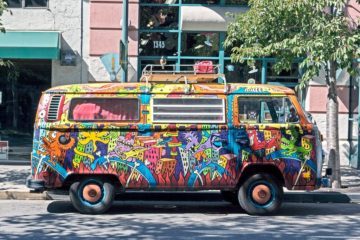
I dated a few boys, but I fell in love with Greg. I met him at a sock hop at the end of the summer, and we started going steady. Greg had his own car—there’s nothing like a car in the summer! Places to go, friends to see. He played music on his car’s tape deck, or we’d sit in his room and listen to his LP’s. He played Cream’s new album for me, “Disraeli Gears.” I loved all of their songs, psychedelic and rock, especially” Sunshine of Your Love.” I didn’t use my transistor 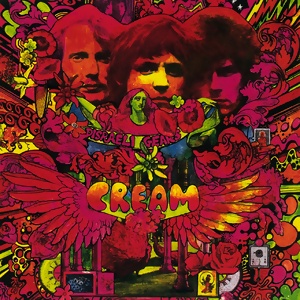 radio very much that summer, and didn’t need to go to sock hops anymore to meet boys.
radio very much that summer, and didn’t need to go to sock hops anymore to meet boys.
Soon it was fall, and we were both seniors, preparing for proms and college applications. And what a year it turned out to be! There was a lot of civil unrest, with Black Power protests and Vietnam war protests. The presidential elections were heating up, with candidates Nixon, Humphrey and Wallace, all with bitterly opposed views. Dr. Martin Luther King was assassinated on April 4, which sparked 2 days of rioting and burning in Chicago and other major cities. The Chicago riots protesting the conventions of 1968 were yet to come.
Soon the year was over and we graduated. It was summer. And what a summer it was! I was worked as a typist, earning money for college. In early August, I attended my first rock concert, Jimi Hendrix at the auditorium theater. Greg and I would go out in the evenings, careful to avoid the dangerous neighborhoods and, later, the downtown protests during the Democratic convention. It was a summer of waiting—waiting for college, waiting for the elections, waiting for something to happen. There was revolution in the air, and it was reflected in the music. Songs protesting the war and segregation 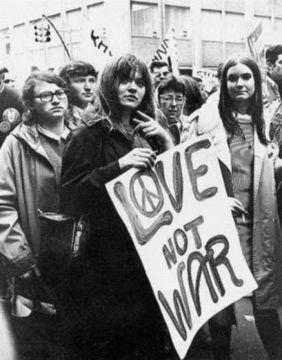 came to prominence, such as The Beatles’ “Revolution,” Country Joe and the Fish’s “1-2-3 What are we fighting for?” “Credence Clearwater’s “Fortunate Son.,” James’ Brown’s “Say It Loud, I’m Black and I’m Proud.” Change was in the air.
came to prominence, such as The Beatles’ “Revolution,” Country Joe and the Fish’s “1-2-3 What are we fighting for?” “Credence Clearwater’s “Fortunate Son.,” James’ Brown’s “Say It Loud, I’m Black and I’m Proud.” Change was in the air.
There were big changes for me, too. I broke up—painfully–with Greg, so I could go off to college unattached. I moved into my dorm room. I said goodbye to my childhood, and to my summer transistor radio. Those days of summer with my transistor were over forever.
